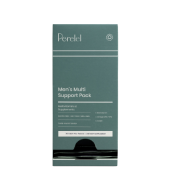We often see what’s referred to as “mommy brain” associated with negative connotations like forgetfulness. But in reality, pregnancy and motherhood are a brain formative experience. According to growing research, a woman’s brain experiences changes more intensely during pregnancy and postpartum than all other points in her development, including puberty. And contrary to what some may think, many of these changes are actually positive and will end up being your secret power in this next chapter of life.
First thing’s first. There is no scientific evidence that “mommy brain” impacts your IQ or makes you less smart. Many women describe that they feel foggy and slow or have some word-finding difficulties. We believe this is likely due to biological changes in your brain during pregnancy as well as the fact that your brain is now divided between yourself, your new baby, and, of course, sleep deprivation. We don’t know exactly how the hormone surges during pregnancy change a woman’s brain but several studies comparing brains of women who had recently given birth to those who have never given birth demonstrate that those who recently had a child had a reduced volume of gray matter that lasted approximately two years following birth.1
That reduction in gray matter is found in the region of the brain called the hippocampus, which regulates motivation, emotion, learning, and memory. This might explain the occasional failures in remembering specific details, but is responsible for increased social cognition or empathy that strengthen communication with your infant and sharpen your ability to pick up on your baby’s nonverbal communication, which is essential to mother-baby bonding and the survival of your infant.
This also has shown to be the time that the adult brain is at its most plastic, which refers to neuroplasticity. Neuroplasticity is the brain’s ability to reorganize itself by forming new neural connections. The changes we are seeing in imaging of pregnant and postpartum women indicate that women going through the transformation of motherhood might lose some connections dealing with remembering specific details in exchange for the strengthening of connections focused on bonding and adapting to caring for a non-verbal infant.2 So while you may be struggling to recall someone’s name, our “mommy brain” may actually be why we’re so in sync with understanding the needs of our babies and children.
Have you been experiencing “mommy brain?” Tell us about your experience. Join the Perelel community on social or by subscribing to our newsletter.
1 Oatridge A, Holdcroft A, Saeed N, et al. Change in brain size during and after pregnancy: Study in healthy women and women with preeclampsia. AJNR Am J Neuroradiol. 2002;23(1):19-26.
2 Gritters J. This is your brain on motherhood. The New York Times.
This article is for informational purposes only. It is not, nor is it intended to be, a substitute for professional medical advice, diagnosis, or treatment and we recommend that you always consult with your healthcare provider. To the extent that this article features the advice of physicians or medical practitioners, the views expressed are the views of the cited expert and do not necessarily represent the views of Perelel.




















